Electric guitar strings are more than just parts of the guitar. They are its heart and soul. The strings connect the musician to their instrument. Many guitar players don’t consider string longevity. A lot of them expect their strings to last longer than they actually do.
This article is all about how to clean your electric guitar strings. Cleaning helps them last longer and keeps your music sounding great. Keeping your strings clean is important. Eguitarmania talks about simple ways to take care of your strings. This will help them stay in good shape, making your music sound its best.
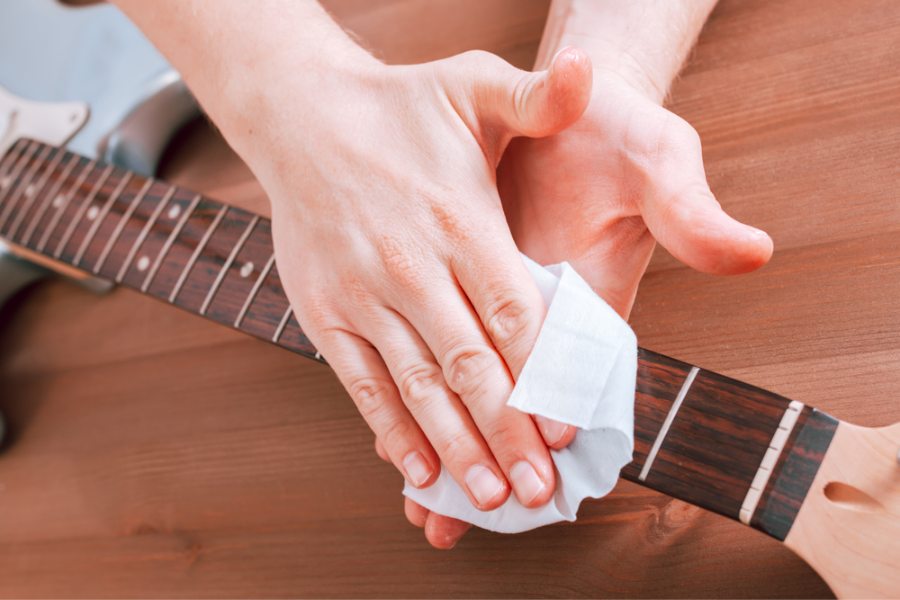
How to Clean Electric Guitar Strings?
Here is our easiest step-by-step guide to cleaning electric guitar strings:
Step 1: Remove dust
Before applying any liquid cleaners, I always start with a Dry cloth. Wiping down the strings with a dry cloth after every playing session. This little step helps to eliminate a lot of the perspiration and oils that build up while playing.
Step 2: Identify the spot
Closely inspect the strings along their entire length, looking for spots with extra grime or oxidation. This step helped me define the right solution and techniques to deal with the debris.
Step 3: Using a String Cleaner
Now is the step: we apply liquid cleaner, use a cloth, and gently rub along the strings. Pay extra attention to the extra grime spots; you can use rubbing alcohol to break down the dirt.
Step 4 : Cleaning the Fretboard
It is important to clean the fretboard, which helps in maintaining both the wood and the area around the frets.
Step 5: Wipe all remaining moisture
After cleaning, use a dry cloth to remove any residual cleaning agents or moisture. My special care for those strings is string conditioner. It is optional but can be beneficial for the longevity of the guitars.
Types of Electric Guitar Strings: A Comprehensive Guide
It’s crucial to understand that choosing the right strings for your guitar can be a more important choice than many realise. There are a wide range of strings out there, and each offers something unique and different when played.
Guitar strings are divided into two groups, first is the material they are made of, and the second is how they are constructed. The strings you choose can significantly impact the playability, tone, and overall experience of playing an electric guitar.
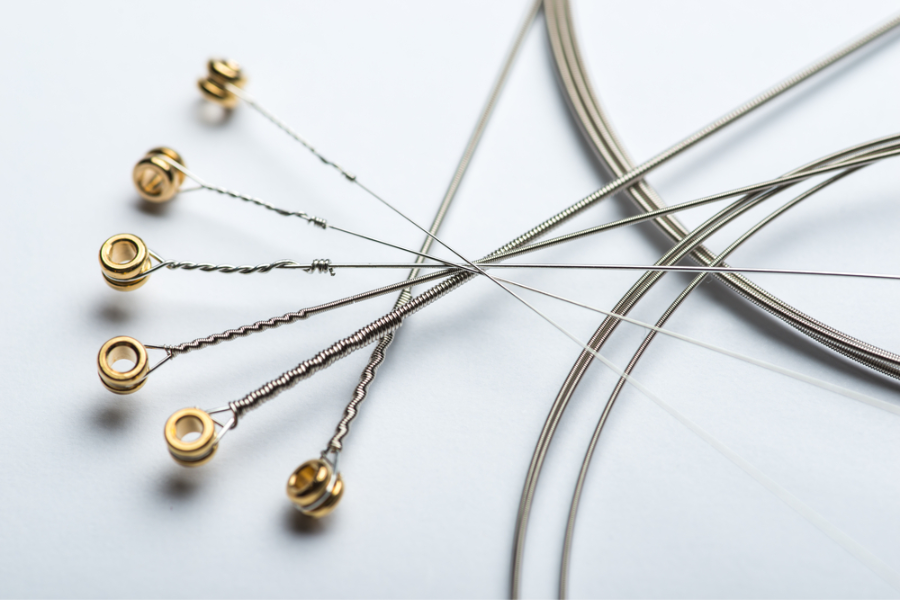
Electric guitar strings are primarily made from metal, nylon, or bronze. The tone and feel of the strings are greatly affected by the material used.
Stainless Steel
Stainless steel strings are known for their bright, crisp tone. Due to its high-carbon hex core, it maximizes string life and durability. They tend to feel smoother, which can be preferable for fast playing and sliding. Stainless steel is highly resistant to corrosion, which makes it last longer than other materials.
- Advantage: Great for players who have acidic sweat and need more durable strings.
- User suitability: ideal for players who want piercing and bright sound.
Nickel-Plated Steel
Nickel-plated guitar strings are the most popular type of electric guitar string on the market. They are available in different sizes and numbers. They have the perfect blend of a snappy attack and a smooth sound. A combination of nickel and steel offers a balanced tone, while the steel adds brightness and sustain.
- Advantage: Suitable for a variety of music genres, from rock to jazz, versatile to a wide range of genres.
- User suitability: a good start for beginners and people who enjoy playing diverse genres of music.
Nylon strings
Nylon strings on their steel-string guitars, leading to a softer and warmer tone in their music. These strings are typically used on nylon-string guitars or classical guitars. Compared to metal strings, nylon strings have a lighter sound and a softer and warmer tone in their music. One downside of using nylon strings is their lack of versatility in different genres.
- Advantage: Great for players who need more durable strings and a light sound.
- User suitability: ideal for players who love lower tension and smooth treble notes.
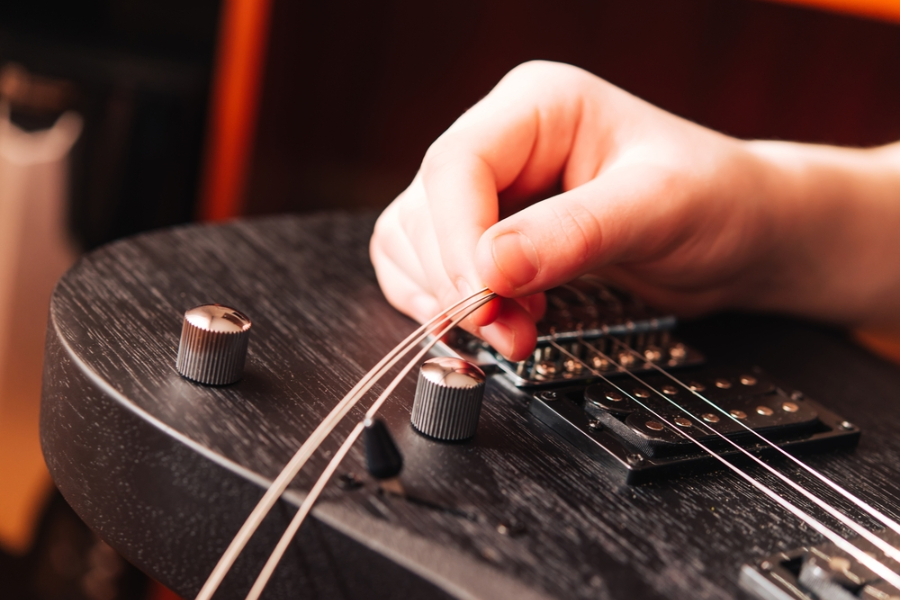
Pure Nickel
Pure nickel electric guitar strings are made with 100% nickel wrap wire. This material delivers a warm, vintage tone reminiscent of 1950s and 1960s rock. Compared to other strings, pure nickel electric guitar string produces a warmer and creamier sound.
- Advantage: have a softer attack that compliments vintage-voiced pickups well.
- User suitability: ideal for players who want to recreate vintage, classic genres.
Beside material, electric guitar strings can be grouped by how they are constructed.
String core: The Heart of Electric Guitar
You can tell a guitar string by its form, or “core,” and there are two main varieties: hex and round. Acoustically, the blues and classic rock are perfect for the round core strings’ gentler tones. On the other hand, hex core strings tend to be brighter and louder, producing a very contemporary tone that is better suited to current metal and rock.
Polymer Coating
A standard guitar string is usually coated with a plastic polymer. Coated strings are also typically more expensive due to the fact that they will last longer. The reason for this is that coated strings will last longer than uncoated ones.
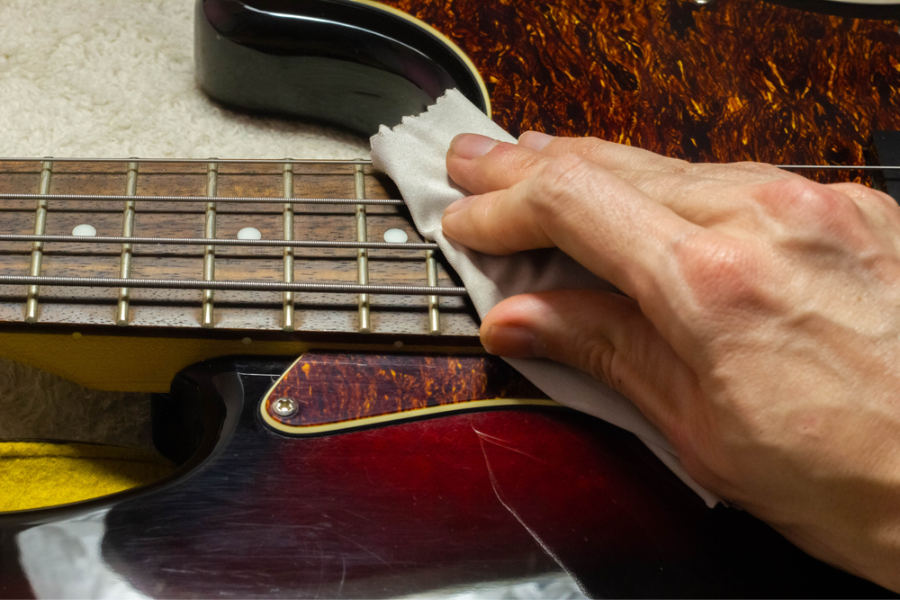
Winding type
Roundwound, flatwound, and halfround are the three most common winding styles for modern guitar strings. Most windings are roundwounds, which provide a bright tone and sound. Because of their deeper tone and flat surface, flatwound strings are more popular in jazz. Halfround strings, which fall somewhere in the middle between round and flat, are rather common in contemporary music.
Gauge
Gauge refers to the thickness of the strings, affecting both playability and tone. Thicker strings will usually produce heavier, full-bodied notes, while the thinner strings have a brighter and tinnier sound. Thin gauges usually start at .09 and lower, while thick gauges will be over .012.
| Gauge Category | Thickness Range (inches) | Characteristics |
| Extra Light | .008 to .038 | Easier to play, brighter tone, less sustain, ideal for fast playing styles |
| Light | .009 to .042 | Balanced playability and tone are popular for lead guitarists |
| Medium | .010 to .046 | Richer tone, more sustain, preferred for rhythm guitarists |
| Heavy | .011 and higher | Greater volume and sustainment require more finger strength |
What Are Some Best Cleaning Solutions for Guitar Strings?
There are several safe and effective options for cleaning electric guitar strings:
- Rubbing alcohol: Use a 70% IPA solution on a lint-free, clean cloth to apply isopropyl alcohol (IPA). Apply sparingly and carefully wipe away from the fretboard and pickups along the strings. IPA immediately disappears, leaving no trace.
- String wipes: Made especially for cleaning guitar strings, these pre-moistened towels. They often include light lubricants and cleaning solutions to keep your strings looking new longer by getting rid of dirt and debris.
- Distilled water: To give the strings a gentle cleaning, moisten a delicate cloth with distilled water and wipe them down. This is a fantastic, non-chemical alternative for clearing light dirt and dust.
- Dry microfiber towels: These cloths work well for removing smudges and dust from strings. To buff the strings, move in a circular motion and don’t apply too much pressure.
Here are some reputable string conditioners that have received positive reviews from guitarists:
As an electric guitar enthusiast, I’ve had the opportunity to explore a variety of string conditioners, each with its own unique qualities. Starting with GHS Fast Fret, I appreciate its ease of use and how quickly it dries. Its stick applicator is a real game-changer for me, especially when I need a quick touch-up during sessions. However, I do notice that Fast Fret doesn’t penetrate as deeply as others, necessitating more frequent applications.
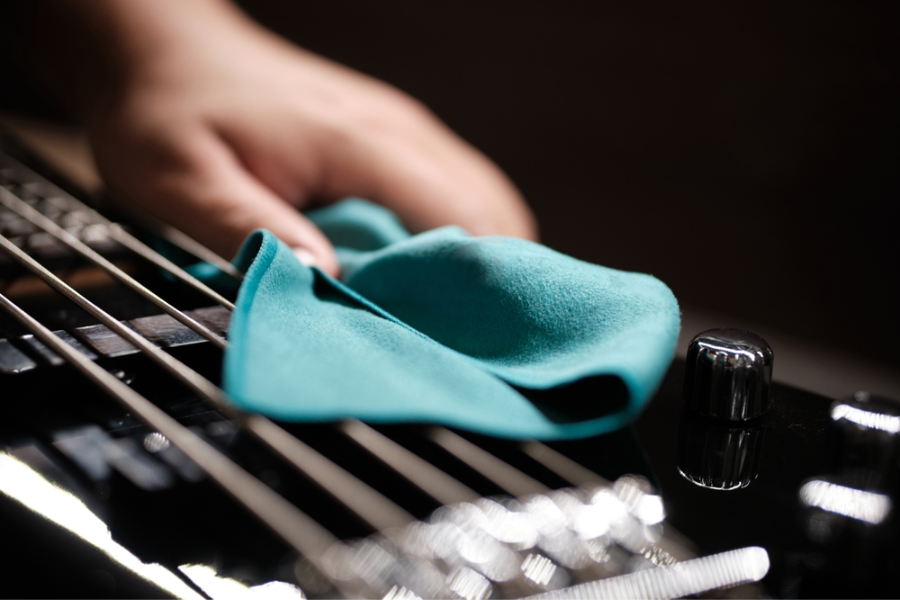
Moving on to Dunlop Ultraglide 65, the smoothness it imparts on the strings, thanks to its PTFE formulation, really enhances my playability. It’s particularly noticeable during fast passages and intricate solos, making it a staple in my maintenance kit.
Finally, the Planet Waves Hydrate String Conditioner has a special place in my toolkit. Its blend of natural oils not only protects the strings but also maintains their natural feel, which is vital for my playing style. I particularly appreciate how it helps preserve the bright tone of the strings.
When To Clean Your Strings?
Here’s a table that outlines different scenarios or situations when you should consider cleaning your electric guitar strings:
| Frequency | Reason |
| Daily | If played daily, wipe strings after each use to remove oils and sweat. |
| Weekly | For regular players, a thorough cleaning weekly maintains string quality. |
| Monthly | If played occasionally, clean monthly to prevent buildup of grime. |
| Seasonally | Deep clean every season change, especially if stored or exposed to different environmental conditions. |
| Before/After Storage | Clean before storing for long periods and after taking out of storage. |
| Before Performances | Always clean before a performance or recording session for optimal sound. |
Conclusion
If you want your guitar to sound great and last a long time, it’s important to keep it clean and in excellent repair. It is my sincere wish that this post sheds light on ways to extend the life of your guitar strings and gives you a “tone” of alternatives to choose from. With the correct equipment, regular instrument maintenance becomes second nature, and you’ll end up saving a ton of money.









